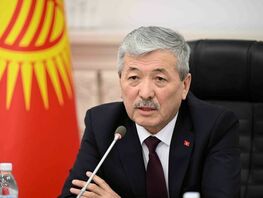Chairman of the Cabinet of Ministers of the Kyrgyz Republic — Head of the Presidential Administration Adylbek Kasymaliev spoke at the plenary session of the International Environmental Conference as part of his working visit to the Altai Republic of the Russian Federation.
According to him, today, environmental issues, including climate change, loss of biodiversity and environmental pollution, require urgent and coordinated action at the international level.
In his speech, Adylbek Kasymaliev emphasized that Kyrgyzstan has a rich natural heritage — its highlands, glaciers, pastures and lakes create unique ecosystems.
About two percent of all plant species and over three percent of animals on the planet live on the territory of Kyrgyzstan. Like mountainous areas in many parts of the world, Kyrgyzstan’s ecosystems are under serious pressure due to climate change.
«According to World Bank estimates, water deficit in the Central Asian region may reach 20-30 percent by 2050. In this regard, Kyrgyzstan prioritizes joint work to strengthen climate resilience. The country has organized systematic monitoring of the glaciers of the Northern, Central, Inner Tien Shan, the Issyk-Kul basin and the Pamir-Alai, choosing key sites for continuous observations.
Under the UN Framework Convention on Climate Change (UNFCCC), despite the low volume of greenhouse gas emissions, compared to developed countries, we voluntarily aim to reduce emissions by 16 percent by 2030, and with the support of international donors — by 44 percent. The Concept of Carbon Neutrality until 2050 has been adopted. In this regard, it is worth noting that the states responsible for 80 percent of emissions must contribute to ensuring climate justice, including financing and technology for low-emission countries,» he said.
The head of the Cabinet noted that Kyrgyzstan has been promoting the mountain agenda in the international arena for more than 20 years.
The «Dialogue on Mountains and Climate Change» was initiated within the framework of the UN Framework Convention. Also, at the 77th session of the UN General Assembly, on the initiative of the Kyrgyz Republic, the resolution «Sustainable Mountain Development» was adopted. In April of this year, the «Global Mountain Dialogue» conference was held in Bishkek, which was attended by representatives of 50 countries from Europe, Asia, America, Africa and 29 international organizations.
As the Chairman of the Cabinet of Ministers noted, the republic is promoting the Declaration on Climate Change, Mountains and Glaciers within the framework of global climate processes, which has been supported by 21 states to date, including the Russian Federation.
In 2027, we plan to hold the second Global Mountain Summit «Bishkek + 25».
At the initiative of the Kyrgyz Republic, in 2024, the UN declared October 23 as the International Day of the Snow Leopard (ilbirs) — as a reminder of the importance of preserving its population. Based on the fact that the snow leopard is a symbol of healthy mountain ecosystems, we are taking active measures.
Thus, a presidential decree on the snow leopard as a national symbol was adopted, and a state strategy for its protection was developed. Just a month ago, the ninth meeting of the Global Snow Leopard and Ecosystem Conservation Program Committee was held in Cholpon-Ata with the participation of 12 range countries, international partners and experts. Thanks to support measures, the snow leopard population in Kyrgyzstan today exceeds 500," he said.
In his speech, Adylbek Kasymaliev noted the fruitful cooperation between Kyrgyzstan and the Altai Republic in the conservation of the snow leopard.
«Three snow leopards were transferred to the Snow Leopard Center of the Altai Republic as an important step in reintroducing and strengthening the population. This is not just a symbolic action, but a contribution to the sustainability of the Altai-Sayan region ecosystem. In total, since 2019, more than 10 joint projects have been implemented with international partners, covering the protection of biodiversity, the creation of ecological trails and expeditions.
Two ecological corridors have been created in Kyrgyzstan: Chatkal and Ak Ilbirs. In order to preserve biodiversity in Central Asia, we propose to consider the possibility of creating transboundary ecological corridors, covering the territories of neighboring countries. The creation of transboundary ecological corridors not only contributes to the conservation of biodiversity, but also opens up new opportunities for sustainable development, including in the field of ecotourism,» he said.
According to the Chairman of the Cabinet of Ministers, a network of 96 specially protected natural areas with a total area of more than two million hectares has been created and is currently functioning in Kyrgyzstan to maintain biodiversity.
Kyrgyzstan also considers ecotourism as one of the priority areas of ecologically and economically balanced growth.
Last year, 8.9 million tourists visited the country, and more than 20 percent of them chose ecotourism routes.
«At the same time, ecotourism cannot develop without proper protection of natural areas from pollution, primarily from plastic products. Plastic waste poses a serious threat to vulnerable ecosystems, including Issyk-Kul and the fragile mountainous regions of the Tien Shan. In this regard, from 2027, a complete ban on disposable plastic products that cannot be recycled is planned. Greening plays an important role in the environmental well-being of any region. Since 2022, the campaign Zhashyl Muras (Green Heritage) has been implemented. Over 29 million young trees have been planted in three years. In total, more than 70 million seedlings are planned to be planted within the framework of the campaign. In conclusion, I would like to note that combining efforts to protect the environment and preserve natural resources is the basis for the sustainable development and well-being of our peoples,» Adylbek Kasymaliev said.






